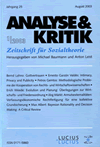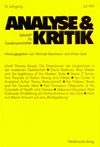Suchergebnisse
"Paul D. Thorn"
Titel: Meta-Induction and the Wisdom of Crowds
Autor: Paul D. Thorn / Gerhard Schurz
Seite: 339-365
Abstract: Meta-induction, in its various forms, is an imitative prediction method, where the prediction methods and the predictions of other agents are imitated to the extent that those methods or agents have proven successful in the past. In past work, Schurz demonstrated the optimality of meta-induction as a method for predicting unknown events and quantities. However, much recent discussion, along with formal and empirical work, on the Wisdom of Crowds has extolled the virtue of diverse and independent judgment as essential to maintenance of 'wise crowds'. This suggests that meta-inductive prediction methods could undermine the wisdom of the crowd inasmuch these methods recommend that agents imitate the predictions of other agents. In this article, we evaluate meta-inductive methods with a focus on the impact on a group's performance that may result from including meta-inductivists among its members. In addition to considering cases of global accessibility (i.e., cases where the judgments of all members of the group are available to all of the group's members), we consider cases where agents only have access to the judgments of other agents within their own local neighborhoods.
Titel: Meta-Induction and the Wisdom of Crowds
Autor: Christian J. Feldbacher
Seite: 367-382
Comment on Paul D. Thorn and Gerhard Schurz
Abstract: In their paper on the influence of meta-induction to the wisdom of the crowd, Paul Thorn and Gerhard Schurz argue that adding meta-inductive methods to a group influences the group positively, whereas replacing independent methods of a group with meta-inductive ones may have a negative impact. The first fact is due to an improvement of average ability of a group, the second fact is due to an impairment of average diversity within a group by meta-induction. In this paper some critical remarks to meta-inductive group expansion and replacement are made. In particular it is stressed that both ability and diversity are of equal importance to a group's performance.
Titel: Applying Formal Social Epistemology to the Real World
Autor: Carlo Martini
Seite: 383-398
Comment on Paul D. Thorn and Gerhard Schurz
Abstract: The claim that diversity and independence have a net positive epistemic effect on the judgments of groups has been recently defended formally by Scott Page, among others, and popularized in Surowiecki’s The Wisdom of Crowds. In Meta-Induction and the Wisdom of Crowds Thorn and Schurz take issue with the claim that more diversity and independence in groups leads to better collective judgments. I argue that Thorn and Schurz’s arguments are helpful in clarifying a number of over-generalizations about diversity and independence that are often circulated in the social epistemology literature. I also argue that the relevant formal arguments are easily misunderstood when presented ’in a vacuum’, that is, without a context of application in mind. I provide a different approach to understanding formal results in social epistemology: With the help of concrete scenarios and the formal literature, I focus on a trade-off between independence and dependence in groups. I show that the approach works well also for another principle in social epistemology; namely, the principle that ’more heads are better than few’.
Titel: Good Listeners, Wise Crowds, and Parasitic Experts
Autor: Jan-Willem Romeijn / Tom Sterkenburg / Peter Grünwald
Seite: 399-408
Comment on Paul D. Thorn and Gerhard Schurz
Abstract: This article comments on the article of Thorn and Schurz in this volume and focuses on, what we call, the problem of parasitic experts. We discuss that both meta-induction and crowd wisdom can be understood as pertaining to absolute reliability rather than comparative optimality, and we suggest that the involvement of reliability will provide a handle on this problem.

Social Epistemology
2012 (34) Heft 2
Editorial
The research program of social epistemology developed from a critique of philosophical epistemology around thirty years ago. Since then it has attracted ever-growing attention among philosophers. But social epistemology also offers prolific alignments for the social sciences. The starting point of social epistemology is the elementary fact that most of our knowledge is acquired not by our own autonomous exploration but by relying on information from others: on testimony. This is especially true ...

Soziobiologie
1994 (16) Heft 1
Editorial
Die Soziobiologie überschneidet sich in ihrem Gegenstandsbereich mit der Soziologie. Damit ist Konkurrenz, aber auch gegenseitige Ergänzung möglich. Die Tatsache, daß sich die Soziobiologie mit den genetischen Grundlagen menschlichen Verhaltens beschäftigt, hat allerdings das Verhältnis eher als ein ausschließendes Konkurrenzverhältnis erscheinen lassen - vor allem in der Sicht der Vertreter der traditionellen Soziologie. Sie haben diese Konkurrenz häufig nicht nur als eine wissenschaft...